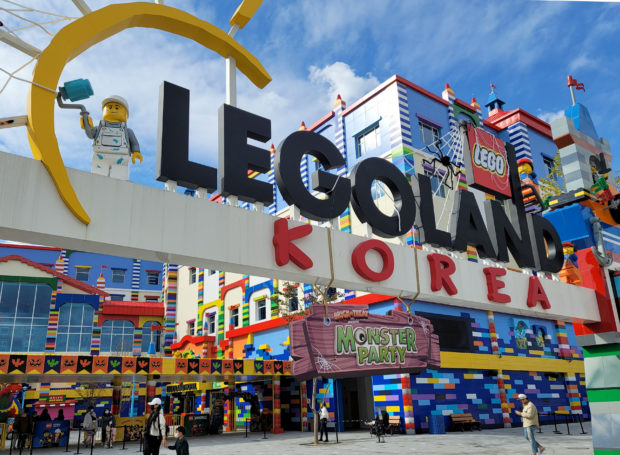South Korea’s Legoland default points to wider bond market stress

An entrance of Legoland Korea theme park is pictured in Chuncheon, South Korea, Oct 24, 2022. Yonhap via REUTERS
SEOUL -A missed bond payment by the developer of a South Korean theme park has rattled the country’s money markets and raised worries about the prospect of a credit crunch similar to the kind that threw China’s property market and economy into crisis.
South Korea’s central bank and financial regulators scrambled this week to contain the risks of wider financial fallout as local short-term yields spiked, crippling some major institutions’ ability to meet near-term funding needs.
Money market yields have soared since Gangwon Jungdo Development Corp., the developer of the new Legoland Korea theme park east of Seoul, missed bond payments worth 205 billion won ($144 million) due on Sept. 29.
While official efforts to calm markets have prevented wider dysfunction in financial markets this week, money market confidence is fragile with the yield on 91-day commercial paper at a 13-year high of 4.58 percent on Friday from 3.25 percent a month earlier.
“The Legoland case was like getting COVID when you are barely breathing at an intensive care ward,” said Cho Dou-hyung, a credit analyst at Shinhan BNP Paribas Asset Management. “It looks like the credit market is getting enough policy support for now, but the jitters are unlikely to go away unless the Fed and the Bank of Korea give some sort of assurance about possible slowdown in policy tightening.”
The missed debt payment by the Gangwon Jungdo Development has raised questions about loans related to hundreds of thousands of other projects in Asia’s fourth-largest economy and even drawn alarming parallels with China’s property debt crisis.
It also shocked some investors as the case showed even state-backed developers at risk of defaults amid surging interest rates. The company is 44 percent owned by Gangwon Province, whose asset-backed commercial paper (ABCP) was A1 rated and guaranteed by the local government.
“Right now, there is just not enough confidence that these kind of soured loans won’t happen again with rates still going up,” said Cho.
Legoland, a the park resort on the island of Chuncheon that boasts 40 rides and a 154-room hotel, said on Thursday it will close down for three months starting January 2023 “for maintenance.”
Contagion?
Some top-tier state-run enterprises have struggled to obtain financing this week, even after the government’s 50 trillion won ($35.3 billion) package announced on Sunday to buy more commercial debt from financial institutions.
AAA rated state-run Korea Electric Power Corp. (KEPCO) failed to get enough bidders for its three-year corporate bonds on Tuesday, while Korea Gas Corp., also rated AAA, failed to sell a two-year corporate bond.
Incheon Housing and City Development Corp., rated AA+, also failed to sell bonds on Monday.
Gangwon province, which is required to repay the loan as state guarantor of developer’s debt, has said it will pay the entire 205 billion won by Dec. 15.
But Fitch Group’s CreditSights sees risks further down the value chain.
“The financial groups themselves have relatively little exposure to troubled or likely to be troubled ABCP but would feel the after-effects of tougher domestic funding conditions via lower margins for their credit card businesses and increased demand for corporate loans,” CreditSights said in a report released on Friday.
A BOK analysis show South Korea’s commercial and savings banks exposed to 112.2 trillion won of outstanding project finance loans for real estate industry as of June this year, more than double the amount in 2016.
The dire picture for the credit market comes against the backdrop of volatile global financial markets and with the Bank of Korea set to raise interest rates further amid crippling inflation and despite slowing growth.
“We have asked major institutional investors to refrain from excessive selling of bonds or reduction of any planned (bond) purchases given the financial market situation and take a mid- to -long term approach in their investment decisions,” the Financial Services Commission said in a statement on Friday.
($1 = 1,418.3800 won)